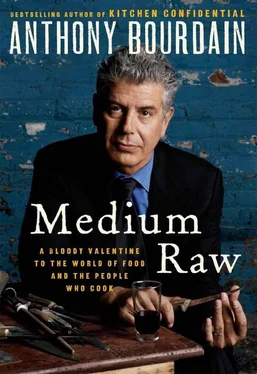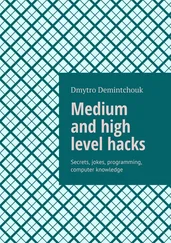Les Halles Tokyo,the excuse—the purpose—for my first trip to Asia, my first, mind-blowing experience on the other side of the world, closed down shortly after. I will always be grateful to Philippe Lajaunie, the owner, for giving me that life-changing experience—and sharing it with me. People say, and I can well believe, that he is a difficult man to do business with. Strangely enough, even when I was doing business with him as owner of Les Halles, we never actually talked business. He is the best of traveling companions. Relentlessly curious, tireless—and totally without fear.
José de Meirelles,his former partner and the guy who hired me at Les Halles, has gone on to other things, taking sole control of the very successful kosher French brasserie Le Marais, in New York City’s diamond district—and opening a Portugese/Spanish-style tapas place (since closed). Les Halles Washington, DC, closed its doors, and Les Halles Miami changed ownership. Thank God, the way I look at it. They were always, in my experience, a drag on the reputation and finances of the mother ship on Park Avenue—and the successful downtown branch on John Street. I still love those two restaurants, still swing by whenever I can, and am much relieved that their bastard cousins in the hinterlands have stopped being a problem.
Tim the waiterstill holds court in the dining room of Les Halles on Park, milking his notoriety for everything he can. If you go to dinner there and inquire of me, he will tell you that you just missed me, that I’m in Thailand having a sex change, or in a Turkish prison, or dog-sledding the Antarctic. Anything but the truth—which means I probably haven’t been around for quite some time.
The kitchens ofLes Halles, finally, and deservedly, are now being run by Carlos Llaguna Morales, who started cooking on the fry station many years ago. He is a fantastic cook—far better than I ever was—and, to my surprise, a much better organizer. The dark recesses of Les Halles’ old cellars are now sparklingly clean and bright, compared to my time. The food handling and control systems, a whole different story. And though the kitchen is the same size, with the same number of cooks, the dining room has expanded into the space that used to house the deli next door, nearly doubling the number of seats. Where, in the old days, we considered a night of three hundred and fifty dinners to be a Monster, they now do as many as six to seven hundred.
In 2007, I got the bright idea that I’d go back to Les Halles and work my old station. The Tuesday double shift, no less—where I used to come in at eight a.m., set up, cook the line for lunch, then slam straight into dinner, behind the stove the whole time. That the dining room had gotten so much bigger and busier, and that I’d gotten so much older, didn’t really occur to me until the date was nearly upon me. I’d figured that it would make good television.
As the implications and likely outcome began to dawn on me, I struggled to find a solution, a distraction, some way to mitigate what could very well be a public butt-fucking of historic proportions.
So I invited Eric Ripert out for dinner and plied him with high-end tequila (which is something of a weakness of his), and when he was in suitably good spirits and nicely relaxed, the time was ripe. I suggested he join me for a rollicking good time cooking together at Les Halles. It’ll be fun, you know…
The result is something I’m very proud of. I managed (just) to bully my way through the night (a not very busy one, by current Les Halles standards). It was hard. Very hard. Made harder by the fact that I could no longer read the dupes. When I’d try and slip on my reading glasses, by the time they reached my nose, they were invariably smeared with grease. My knees were creaky, to say the least. But my moves were still there. I could still—if just barely—do it. But at the end of the night, I knew that to do it again tomorrow—as any real cook would have had to do—was out of the question.
Eric, to my surprise, was smooth. I’d hoped that he, who’d never in his life worked in a turn-and-burn joint like mine, who’d never had to hustle out hundreds of plates—much less grill steaks in such quantities and at such speeds—I figured he’d be thrown for a loop. But no. He made it through elegantly, his uniform as snow-white at the end of the shift as when he’d begun. It was enraging. He does, to this day, however, complain bitterly about how “understaffed” the kitchen is at Les Halles. That it’s “inhuman” to pump out so many meals with so few cooks. And “impossible.” He won’t let go of the subject, either.
I’m proud of the television show that came out of it—because it demonstrated in specific, realistic, and very visual terms not just how a busy kitchen works, but how fucking hard it is; how much it requires of a person, the kind of teamwork, the kind of endurance, the mindset, choreography, and organization—and what it takes away.
When people ask me if I ever miss it, my answer is always the same.
No. I don’t.
I know people want me to say yes. Yes, of course I miss it. But I had enough. I had twenty-eight years of it, I tell them, twenty-eight years. I was forty-four years old when Kitchen Confidential hit—and if there was ever a lucky break or better timing, I don’t know about it. At forty-four, I was, as all cooks too long on the line must be, already in decline. You’re not getting any faster—or smarter—as a cook after age thirty-seven. The knees and back go first, of course. That you’d expect. But the hand-eye coordination starts to break up a little as well. And the vision thing. But it’s the brain that sends you the most worrying indications of decay. After all those years of intense focus, multitasking, high stress, late nights, and alcohol, the brain stops responding the way you like. You miss things. You aren’t as quick reading the board, prioritizing the dupes, grasping at a glance what food goes where, adding up totals of steaks on hold and steaks on the fire—and cumulative donenesses. Your hangovers are more crippling and last longer. Your temper becomes shorter—and you become more easily frustrated with yourself for fucking up little things (though less so with others). Despair—always a sometime thing in the bipolar world of the kitchen—becomes more frequent and longer-lasting as one grows more philosophical with age and has more to despair about.
You’re basically done—or on your way to being done. Your brain knows it. Your body knows it—and tells you every day. But pride persists.
What I do miss, I tell them, and will always miss, is that first pull on a cold beer after work. That is irreplaceable. Nothing approaches that. That’s the kind of satisfaction no bestseller can ever beat—no television show, no crowd, no nothing. That single moment after a long and very busy night, sitting down at the bar with your colleagues, wiping the sweat off your neck, taking a deep breath, with unspoken congratulations all around—and then that first sip of cold, cold beer. It tastes like victory. Happy waiters, flush with tips, are ringing out, the cooks look pleased with you and with each other, and you remind yourself that nothing came back the whole night.
Maybe it’s Curtis Mayfield, “Superfly,” that comes on the sound system then—put on by a sympathetic bartender—or “Gin and Juice” (also for the old folks), or something the moment somehow, by collective will, requires: “Gimme Shelter” or The Stooges’ “Dirt.” Songs from some other time—not this one—songs that will always mean something to somebody present, but maybe you had to be there.
You look at each other with the intense camaraderie of people who’ve suffered together and think,
Читать дальше










